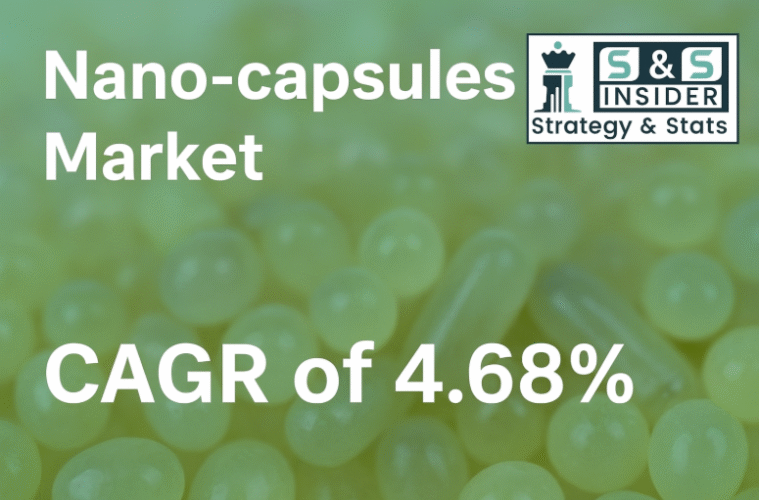The Nanocapsules Market has emerged as a cornerstone of innovation in pharmaceuticals, biotechnology, and various industrial applications. Characterized by its ability to encapsulate active substances in nanoscale shells, nanocapsules offer enhanced stability, controlled release, and targeted delivery mechanisms. According to recent market insights, the global nanocapsules market was valued at USD 3.58 billion in 2024 and is projected to reach USD 5.11 billion by 2032, growing at a CAGR of 4.68% during the forecast period from 2025 to 2032. This growth reflects the increasing adoption of nanocapsules across diverse sectors and the rising demand for precision in drug delivery and other applications.
Understanding Nanocapsules: The Science Behind the Innovation
Nanocapsules are tiny carrier systems typically ranging between 10 to 1000 nanometers in size. Their core-shell structure allows for encapsulation of therapeutic agents, active compounds, or bioactive substances within a protective shell. This architecture not only enhances the stability and bioavailability of the encapsulated material but also enables controlled and sustained release. The precise engineering of nanocapsules has made them highly attractive in areas like oncology, vaccines, nutraceuticals, and cosmetics.
The technological advancements in nanotechnology and material sciences have further propelled the development of sophisticated nanocapsules. Innovations in polymeric, lipid-based, and inorganic nanocapsules have opened new avenues for personalized medicine, ensuring that drugs reach specific tissues or cells with minimal side effects. The scientific community continues to explore modifications to improve encapsulation efficiency, reduce toxicity, and enhance targeting capability, positioning nanocapsules as a critical element in the future of drug delivery systems.
Market Dynamics Driving the Growth of Nanocapsules
The growth trajectory of the nanocapsules market is influenced by several dynamic factors. First, the increasing prevalence of chronic diseases, such as cancer, cardiovascular disorders, and neurological conditions, has created a demand for advanced drug delivery systems that can improve therapeutic outcomes. Nanocapsules offer a solution by allowing precise dosing and targeted delivery, which is crucial in reducing systemic toxicity and improving patient compliance.
Second, the expansion of the pharmaceutical and biotechnology sectors globally has fueled investments in research and development of nanocapsules. Companies are increasingly focusing on integrating nanocapsule-based formulations into their pipelines, particularly for oncology drugs, vaccines, and biopharmaceuticals. This strategic emphasis on innovation is a significant factor contributing to the anticipated market growth from USD 3.58 billion in 2024 to USD 5.11 billion by 2032.
Regulatory support and increasing awareness of advanced drug delivery technologies also play a pivotal role. Governments and health authorities are progressively recognizing the potential of nanocapsules in enhancing treatment efficacy, which encourages both public and private investments in this domain. Additionally, partnerships between pharmaceutical companies, research institutes, and nanotechnology startups are accelerating the translation of laboratory innovations into commercial products.
Application Spectrum: From Healthcare to Industrial Use
While pharmaceuticals remain the dominant end-use segment for nanocapsules, their applications extend beyond medicine. In healthcare, nanocapsules are increasingly used for targeted cancer therapy, where they can deliver chemotherapeutic agents directly to tumor sites while minimizing damage to healthy tissues. This specificity not only improves treatment efficacy but also significantly reduces adverse effects, making nanocapsules a preferred choice for advanced oncology care.
In addition to oncology, nanocapsules are utilized in vaccine development, particularly in mRNA-based vaccines, where encapsulation ensures stability and effective delivery of fragile nucleic acids. Nutraceuticals and dietary supplements also benefit from nanocapsulation, which enhances the bioavailability of vitamins, minerals, and bioactive compounds. Furthermore, in cosmetics and personal care, nanocapsules facilitate controlled release of active ingredients, improving skin penetration and efficacy.
Industrial applications are emerging as well, with nanocapsules being used in food preservation, agrochemicals, and enzyme delivery systems. The versatility of nanocapsules in diverse domains highlights their importance as a multifunctional platform, supporting steady market expansion during the forecast period.
Regional Insights: Growth Trends Across Global Markets
The North American region remains a significant contributor to the global nanocapsules market due to advanced pharmaceutical infrastructure, high R&D expenditure, and early adoption of nanotechnology-driven therapies. The presence of leading biotech companies and academic research hubs further strengthens the market’s foundation in this region.
Europe follows closely, driven by strong healthcare systems, increasing incidence of chronic diseases, and supportive regulatory frameworks for innovative drug delivery solutions. The region’s focus on personalized medicine and precision therapeutics aligns with the capabilities of nanocapsules, encouraging their widespread application.
The Asia-Pacific market is witnessing rapid growth due to rising healthcare awareness, increasing pharmaceutical manufacturing capabilities, and government initiatives supporting nanotechnology research. Emerging economies such as China and India are investing heavily in R&D and industrial applications, contributing to a growing demand for nanocapsules across healthcare, nutraceuticals, and agriculture sectors.
Future Outlook: Opportunities and Challenges
The projected growth of the nanocapsules market to USD 5.11 billion by 2032 underscores a promising future. Innovations in material science, polymer chemistry, and bioengineering are expected to drive new product developments and broaden application areas. The integration of nanocapsules in precision medicine, gene therapy, and advanced diagnostics presents vast opportunities for market expansion.
However, challenges remain, particularly regarding regulatory approvals, large-scale manufacturing complexities, and potential safety concerns. Addressing these challenges requires a balanced approach that combines scientific rigor with regulatory compliance and technological advancement. As research progresses and more data become available, these barriers are expected to diminish, paving the way for wider adoption of nanocapsules across industries.
Conclusion
The nanocapsules market represents a convergence of scientific innovation, technological advancement, and growing global demand for precision therapies and functional applications. With a market valuation of USD 3.58 billion in 2024 and an expected growth to USD 5.11 billion by 2032 at a CAGR of 4.68%, nanocapsules are poised to play a transformative role in healthcare, biotechnology, and industrial sectors. By enabling targeted delivery, enhancing stability, and optimizing bioavailability, nanocapsules are not just a technological innovation—they are a catalyst for the next generation of advanced therapeutics and multifunctional applications worldwide.

